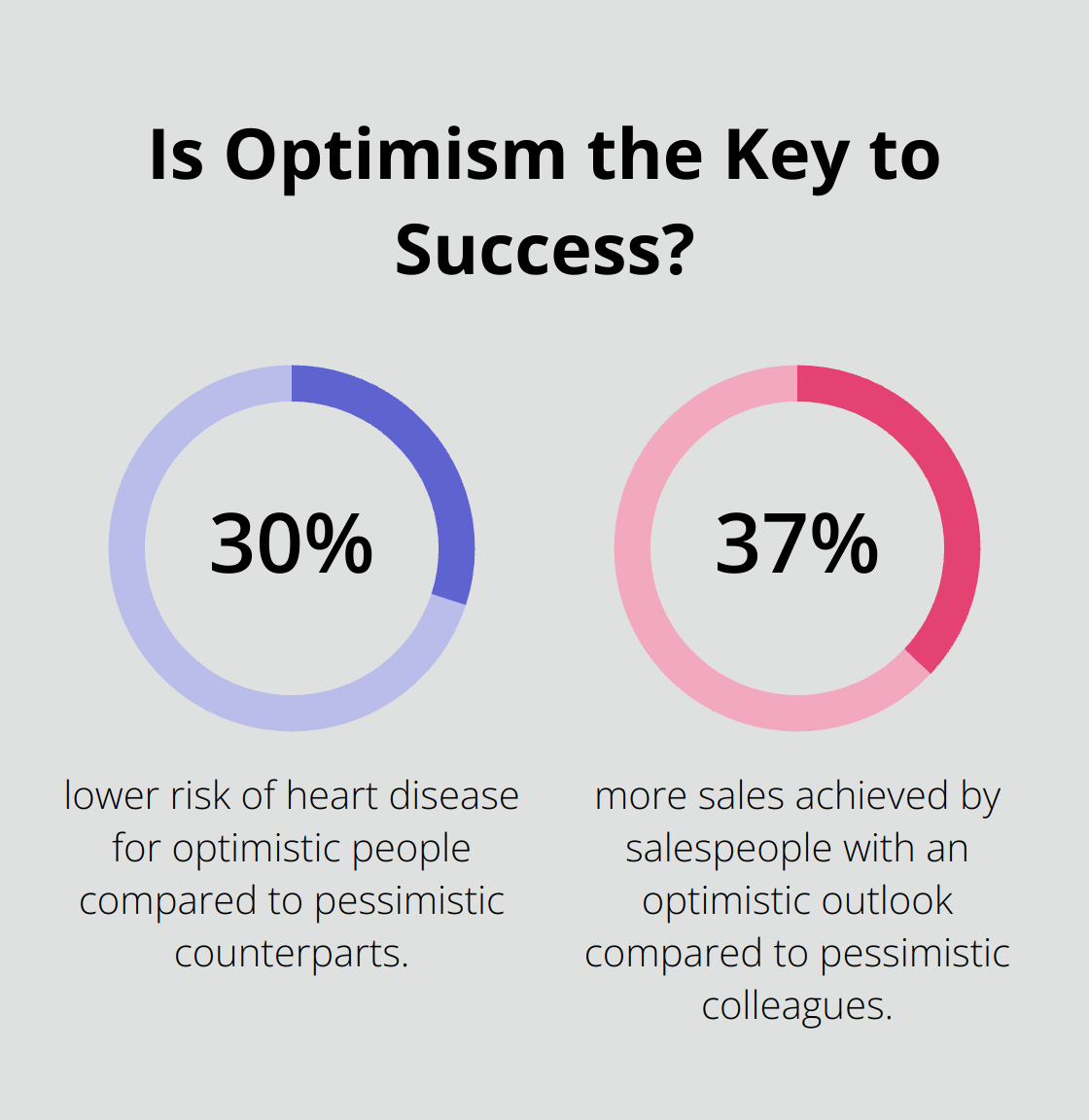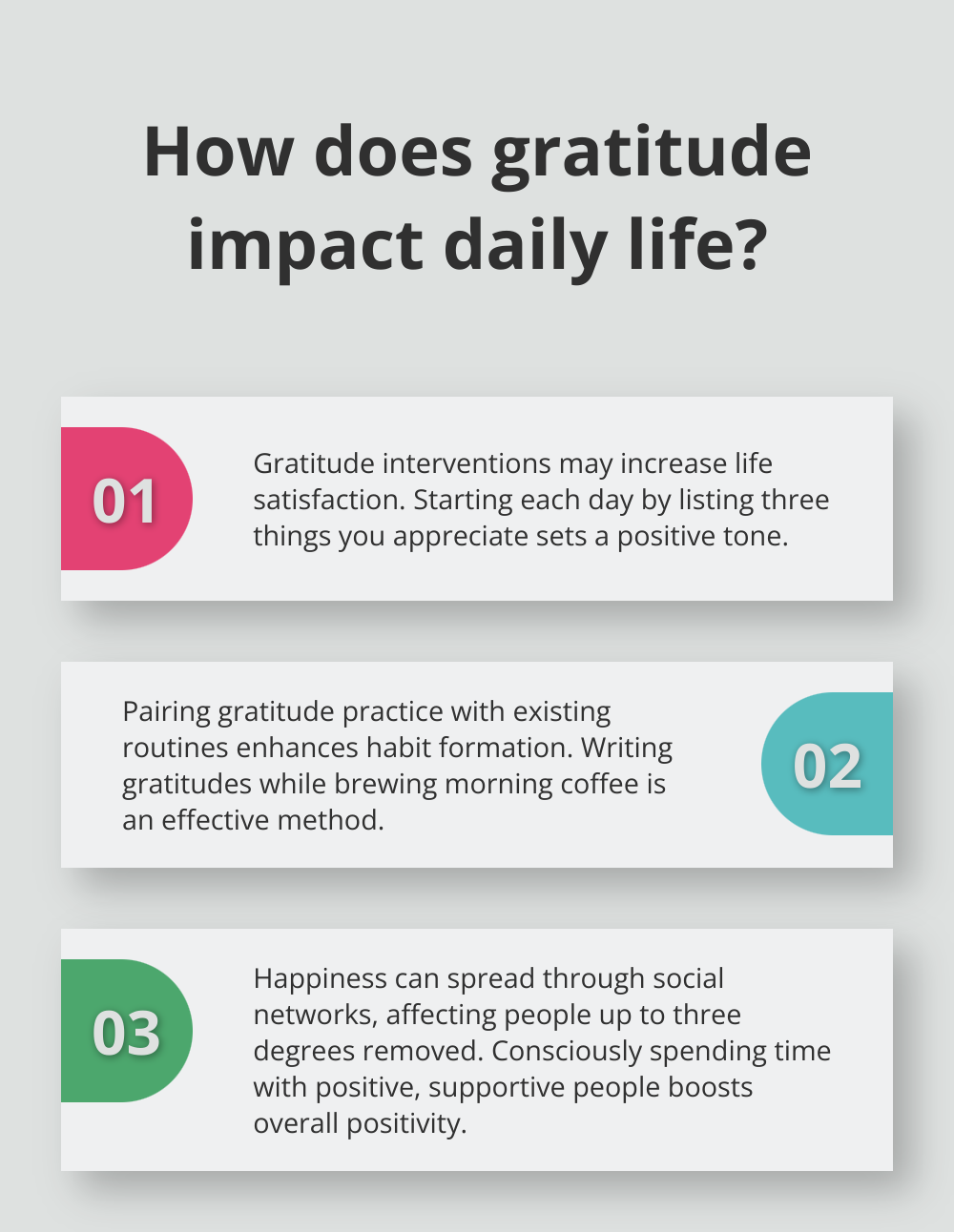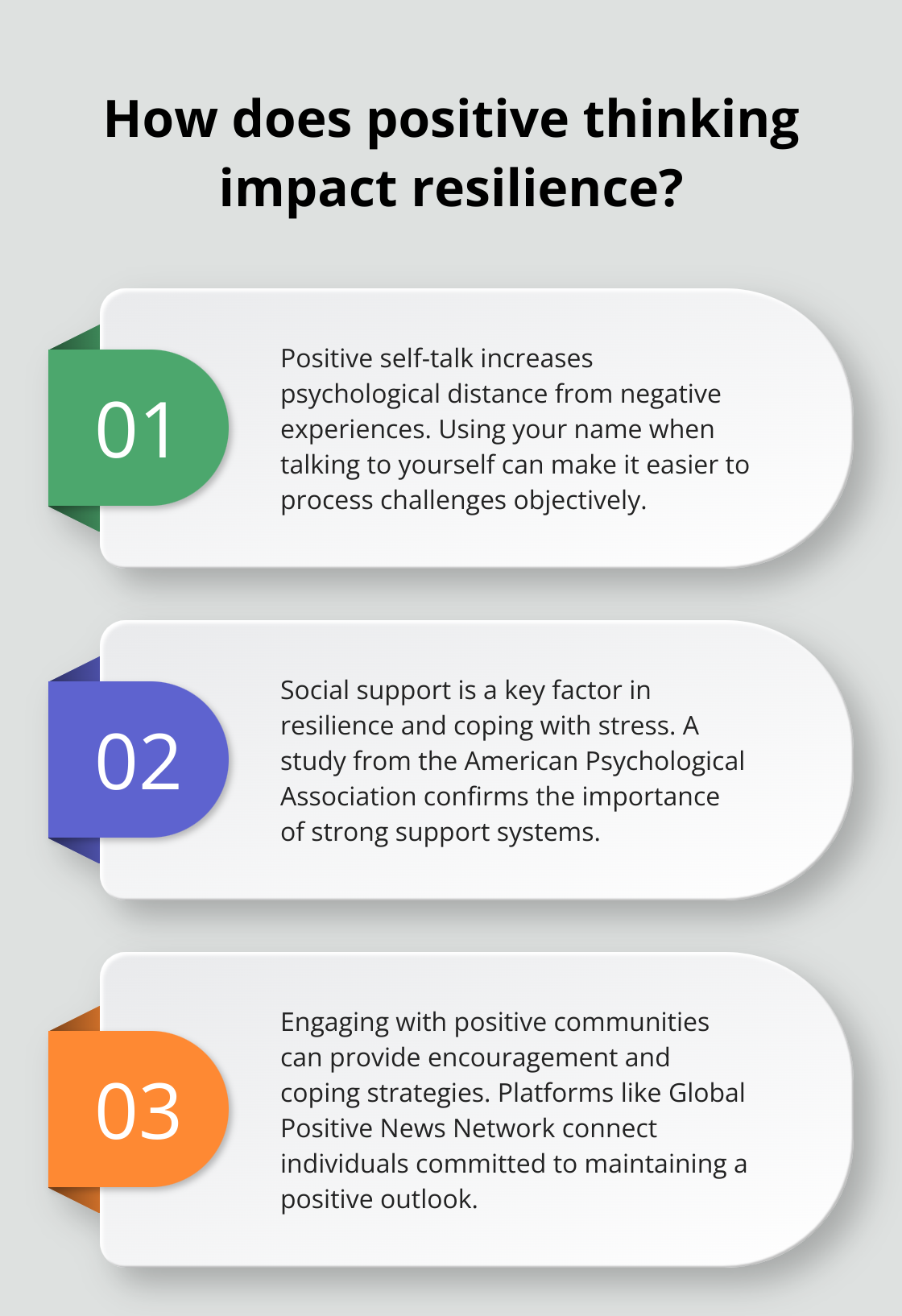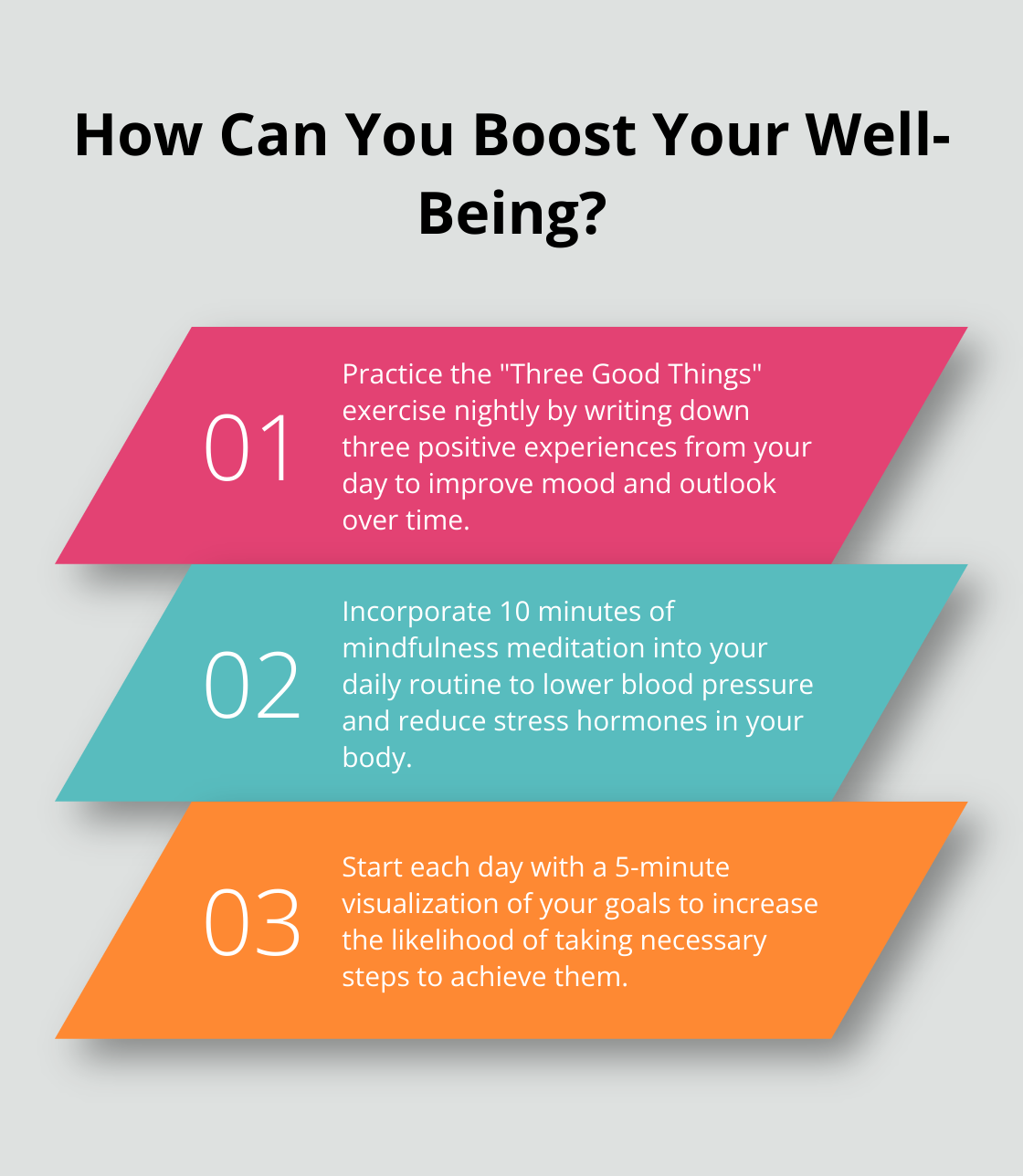At Global Positive News Network, we believe in the transformative power of positivity. In a world that often seems filled with challenges, maintaining a bright outlook can make a significant difference in our lives.
This blog post offers practical tips to stay positive and cultivate a more optimistic mindset. We’ll explore strategies that can help you navigate life’s ups and downs with greater resilience and joy.
Why Positive Thinking Matters
Positive thinking isn’t just a feel-good concept; it’s a powerful tool that can reshape our lives. The impact of embracing optimism leads to remarkable changes in people’s mental and physical well-being.
The Mental Health Boost
Positive thinking has a profound impact on mental health. A study published in the Journal of Positive Psychology shows that individuals who practice gratitude and optimism report lower levels of depression and anxiety. This isn’t just about feeling good; it’s about rewiring our brains for resilience.

One effective technique is the “Three Good Things” exercise. Each night, write down three positive experiences from your day. This simple practice can significantly improve your mood and outlook over time.
Physical Benefits of Optimism
The mind-body connection is real, and positive thinking can have tangible effects on physical health. Research from Harvard Health Publishing reveals that optimistic people have a 30% lower risk of heart disease compared to their pessimistic counterparts.
To harness these benefits, try to incorporate mindfulness meditation into your daily routine. Just 10 minutes a day can lower blood pressure and reduce stress hormones in your body.
Success Through Rose-Colored Glasses
Optimism isn’t just about health; it’s a catalyst for success in all areas of life. A study found that salespeople with an optimistic outlook sold 37% more than their pessimistic colleagues.
To cultivate this success-oriented mindset, start each day with a visualization of your goals. Spend five minutes imagining yourself achieving your objectives, and you’ll increase the likelihood of taking the necessary steps to make them a reality.
Practical Applications of Positive Thinking
Positive thinking doesn’t mean ignoring life’s challenges. It’s about approaching them with confidence and resilience. Here are some practical ways to apply positive thinking in your daily life:
- Practice positive self-talk (replace “I can’t” with “I’ll try”)
- Keep a gratitude journal (jot down three things you’re thankful for each day)
- Surround yourself with optimistic people (their attitudes can be contagious)
The Ripple Effect of Optimism
Your positive outlook doesn’t just benefit you; it impacts those around you. Research shows that optimism can spread through social networks, creating a ripple effect of positivity. This phenomenon (often called “emotional contagion”) can improve team dynamics at work and strengthen personal relationships.
As we explore the power of positive thinking, it’s clear that this mindset shift can lead to significant improvements in various aspects of life. In the next section, we’ll discuss practical strategies for cultivating positivity, helping you build a more optimistic outlook day by day.
How to Cultivate Positivity in Your Daily Life
Start Your Day with Gratitude
Begin each morning by listing three things you appreciate. This simple act sets a positive tone for your entire day. Some experimental research suggested that gratitude interventions may increase life satisfaction compared to neutral control conditions.

To establish this habit, pair it with an existing routine. For example, while you brew your morning coffee, take a moment to write down your gratitudes in a dedicated journal or on your phone.
Curate Your Social Circle
The people we surround ourselves with significantly impact our mindset. A study from the University of California, San Diego, showed that happiness can spread through social networks, affecting people up to three degrees removed from the original person.
Take an inventory of your social circle. Who lifts you up? Who drains your energy? Make a conscious effort to spend more time with those who inspire and support you. This might mean scheduling regular catch-ups with positive friends or joining clubs or groups aligned with your interests and values.
Engage in Joy-Inducing Activities
Incorporate activities that bring you genuine joy into your daily routine. This could be as simple as reading a chapter of your favorite book, taking a short walk in nature, or practicing a hobby you love.
Consistency is key. Even 15 minutes a day dedicated to something you enjoy can significantly boost your mood. A study in the Journal of Positive Psychology found that engaging in small, pleasurable activities daily led to increased overall happiness and life satisfaction.
Practice Mindful Media Consumption
In today’s digital age, we constantly face bombardment with information, much of it negative. While staying informed is important, excessive exposure to negative news can take a toll on our mental health.
Set boundaries for your media consumption. Allocate specific times for checking news and social media, and stick to reputable sources that offer balanced reporting. Consider using apps that limit your screen time or curate positive content (Global Positive News Network is an excellent choice for uplifting stories and positive developments from around the world).
Embrace Mindfulness
Mindfulness serves as a powerful tool for cultivating positivity. It helps you stay present and appreciate the moment, rather than dwelling on past regrets or future anxieties.
Try five minutes of mindfulness meditation each day. Focus on your breath and observe your thoughts without judgment. Over time, you can increase the duration as you become more comfortable with the practice.
A study published in the Journal of Personality and Social Psychology found that participants who practiced mindfulness meditation reported increased positive emotions and decreased negative emotions over time.
These strategies, when implemented consistently, can create a more positive outlook that permeates all aspects of your life. Patience and self-compassion are key as you embark on this journey of positivity. As you cultivate these habits, you’ll likely encounter challenges along the way. In the next section, we’ll explore effective methods to overcome negativity and turn obstacles into opportunities for growth.
Turning Challenges into Opportunities
Recognize Negative Thought Patterns
The first step to overcome negativity is to identify when it infiltrates your thoughts. Common negative thought patterns include all-or-nothing thinking, overgeneralization, and catastrophizing. Pay attention to your inner dialogue. Do you use words like “always,” “never,” or “worst”? These can signal negative thinking.

Try the thought record technique to combat this. When you notice a negative thought, write it down. Then, challenge it with contrary evidence. For example, if you think, “I always mess up presentations,” recall times when your presentations succeeded. This simple act can break the cycle of negative thinking.
Harness the Power of Positive Self-Talk
Positive self-talk is essential for building resilience. Be gentle and encouraging with yourself. If a negative thought enters your mind, evaluate it rationally and respond with affirmations of what is good about you. Research from the University of Michigan shows that using your name when talking to yourself can increase psychological distance from negative experiences, making it easier to process them objectively.
Try this: Next time you face a challenge, pause and say to yourself, “[Your Name], you’ve got this. You’ve overcome difficulties before, and you can do it again.” This small shift in perspective can significantly change how you approach obstacles.
Extract Lessons from Setbacks
Every setback contains a lesson if you look for it. After a disappointment, reflect on what happened. Ask yourself:
- What can I learn from this experience?
- How can I use this knowledge to improve in the future?
- What strengths did I display in handling this situation?
In the school setting, if students fail to achieve their academic goals, they should not attribute failure to external factors or blame others; instead, they should engage in reflective thinking to improve their performance in subsequent tasks.
Build Strong Support Systems
No one should face life’s challenges alone. A strong support system is vital for maintaining a positive outlook during tough times. A study from the American Psychological Association found that social support is a key factor in resilience and coping with stress.
Actively build your support network. This might include family, friends, mentors, or professional counselors. Don’t hesitate to reach out when you need help. Sometimes, simply talking about your concerns with someone you trust can provide a fresh perspective and renewed optimism.
Seeking support is a sign of strength (not weakness). Many successful individuals attribute their achievements to the support they received during challenging times.
Engage with Positive Communities
Surrounding yourself with like-minded individuals who prioritize positivity can significantly impact your outlook. Engage with communities (online or offline) that focus on personal growth, optimism, and mutual support. These connections can provide encouragement, share coping strategies, and offer a broader perspective on life’s challenges.
Platforms like Global Positive News Network not only provide uplifting news but also connect you with a community committed to maintaining a positive outlook. Such engagement can be a powerful tool in your journey towards a more optimistic life.
Final Thoughts
Cultivating optimism serves as a powerful tool for personal growth and well-being. The implementation of strategies such as daily gratitude, positive influences, and challenge reframing can significantly enhance your outlook on life. These tips to stay positive offer profound long-term benefits, from improved health to greater success in various life aspects.

We encourage you to incorporate these positive habits into your daily routine. You can start small with a morning gratitude practice or by limiting exposure to negative media. Global Positive News Network supports your journey towards positivity through our platform of uplifting stories and resources.
Staying positive is a skill you can develop and strengthen over time (with patience and persistence). This journey towards positivity will transform your world and positively impact those around you. Embrace optimism and watch as it changes your life, one positive thought at a time.




